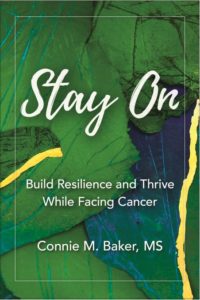Often when we first receive a cancer diagnosis all of our attention and intention is placed on what needs to be done medically. This is a logical and effective place to initiate our path to healing. However, other types of care are equally important.
Atraumatic care
Atraumatic care is care with minimal stress or distress in the process. It might range from a nurturing environment, with music, beauty, essential oils, and people you enjoy to the information and support you need to relieve your stress and anxiety related to your medical care.
If you are having surgery or a procedure, you may have questions about some of the details involved. Find out who can give you the information you need to feel comfortable with what is ahead. This may be as simple as knowing where to park or what to wear. If questions run through your mind and drain your precious energy, ask those questions and resolve your concern.
Your journey may involve medical procedures unfamiliar to you. Perhaps you don’t like surprises. It is okay for you to say to your healthcare provider or caregiver, “Please walk me through what you are doing and explain what I can expect before you do it.” I have had a great experience in this area with only one exception, but that person didn’t seem like the
In the early 1980s, I spent years preparing children for surgery. At that time people were admitted to the hospital the night before surgery, even for a tonsillectomy. After the busy day in the operating and recovery rooms was over, I would take the pediatric patients and any family members on a tour of the operating and recovery rooms, so they could know what to expect. We wore scrubs, hats, and shoe covers. These were fun trips, allaying fear for patients and families. Many facilities have videos for children to prepare them for their medical events.
Preparation for surgery and procedures is not just for pediatric patients, though. Most of us like to know what is happening, so if you have questions…ask them.
At the hospital where I received treatment, a nurse calls before a surgery or procedure to let me know what to expect and what I can and cannot do, like not eating or drinking after midnight. For some of my events, I was told not to wear any makeup. That was traumatic for me. Call it vanity, but I don’t leave the house without makeup.
The large hospital where I go is two miles from my house. You enter in one door for registration and roam from place to place before reaching your destination. I’m in Oklahoma. We know each other here. I wasn’t about to walk around, meeting new people or unexpectedly bumping into people I knew without having my face on. I’m otherwise pretty compliant. I understood what they wanted, though. They didn’t want me to go into surgery wearing makeup. I took facial wipes so that I could clean the makeup off right before surgery. Worked like a dream and is an example of atraumatic care for me.
Self-Care Plan
Too often, we wait until we have a scary diagnosis to do the things we need to do to take care of ourselves. Ideally, we should care for ourselves and the people around us throughout our lives on a regular daily basis.
People may differ on approaches to treatment, nutrition, and supplements, but one component that is virtually undisputed is exercise. When you aren’t feeling well, just getting a few minutes of gentle walking is great. When possible, increase the cardio exercise and add resistance or weight training. Some of the medicine I have taken is not good for my bones, so as soon as I could return to weight training, I did, in hopes of strengthening my muscles and bones.
When I had selected my team, I created my self-care plan entitled Connie Baker 2.0. I became the updated version of myself.
However, there are days that I blow my plan. When that happens, having compassion for myself is essential. Perfection is not the goal.
Occasionally, the people we choose to be our support network or part of our healing dream team are unable to provide the type of care we need. Be an advocate for yourself or find someone who can be an advocate for you.
I encourage you to determine what tools and techniques work best for you and continue to make use of these for the rest of your life. Become an expert in promoting your health, a choice that not only supports you, but also benefits the people around you.
I blend compassion and humor into my mentoring sessions. I’ve found those are essential elements of every healing process.
I’m here to help you identify and manage the stress of your diagnosis and your overall life, and in the process to transform your life through increasing your sense of well-being, energy, and clarity.
I am alive today so I can help you with your health and healthcare challenges so you, too, can thrive with grace and ease amidst inevitable change.
Visit Working Together to learn more.
“Acknowledging the good that you already have in your life is the foundation for all abundance.”
~ Eckhart Tolle – A New Earth ~
Or you may reach me via my contact page.



